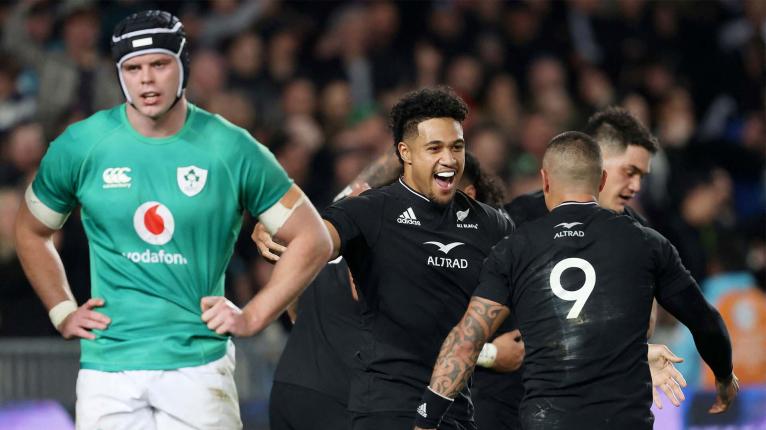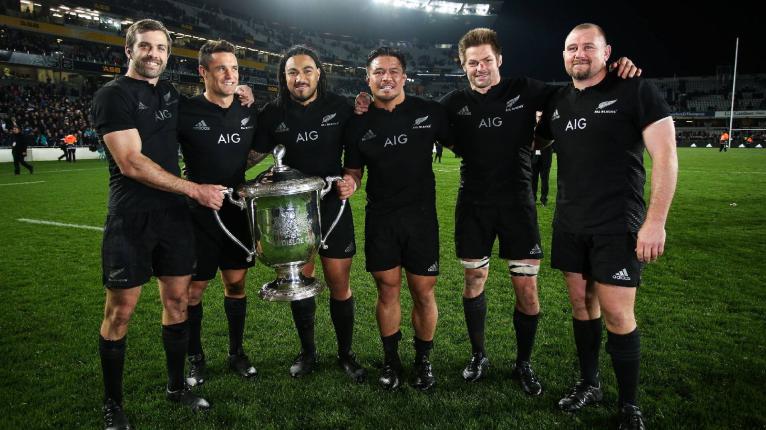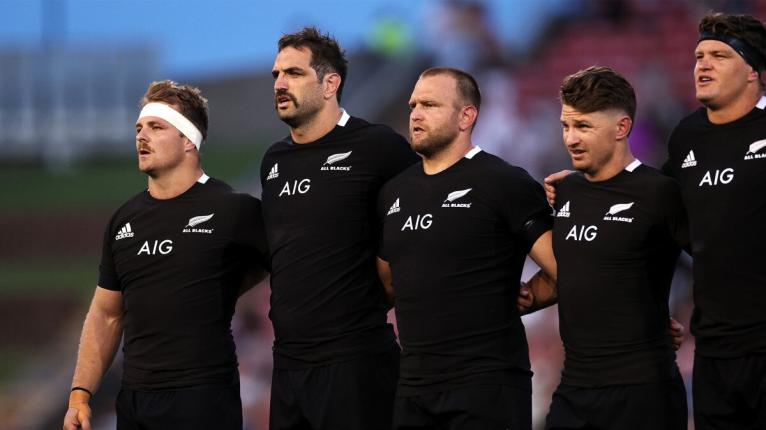Despite all the media fretting and endless attempts to paint the Covid outbreak in the All Blacks camp ahead of the first test of the series against Ireland as a minor catastrophe, the unusual set of circumstances triggered by having some coaches in isolation and a few players ruled out ultimately proved to be a blessing.
The truth is that the All Blacks love a crisis. They always have – it brings the best out of them and the dramas that beset them in their first week of preparation in 2022 were a hugely powerful force in galvanising the team and bringing the players to the fore.
That was the key to their 42-19 victory; it was a win built on the calm and clarity of the senior leaders and their desire to own the performance.
Arguably, this was the first time in this World Cup cycle that the All Blacks’ senior cabal took total ownership of the gameplan and played with the same sort of certainty and authority that defined the team in the Richie McCaw era.
It would be fair to assume that at least some of that ownership and focus on display at Eden Park was a direct result of the pressure the All Blacks were under. Having lost their last two tests of 2021, as well as their final Rugby Championship encounter to the Springboks, the New Zealand public and media have spent much of the last seven months perennially doubting the team and their coaching staff.

A third straight defeat – which would also have ended the 28-year uneaten streak at Eden Park – would have left serious doubts about the longevity of head coach Ian Foster and a few veteran players.
Back the All Blacks into that kind of a corner and they typically respond with an emphatic performance – which is precisely what happened.
However, it would be remiss to not also deduce that the absence of head coach Foster and forwards supremo John Plumtree for most of the week had a profound and unintended consequence – which is that it left the All Blacks so short of management resource – despite drafting in Joe Schmidt as emergency cover – that the senior players had no choice but to take control of the preparation early in the week and have a bigger than usual role in delivering the gameplan.
As Foster himself said after the match: “The work of Sam Cane and our leaders this week was phenomenal. They took a big load. [Assistant coach] Brad Mooar did an awesome job on the ground. It was a unique week, being involved in coaching the All Blacks from home over Zoom. To still be married at the end of the week, I’m pretty satisfied.”
It was certainly unique having Foster, based at home in Hamilton until he re-joined the squad on the morning of the match, communicating with his players and fellow staff remotely via virtual platforms and it would be far from ideal to have to go through a similarly disrupted preparation week again.
At the end of 2004, the All Blacks ripped up their traditional way of doing things, deciding that a dictatorial management regime was not working. Over the next six years, the coaching staff handed greater responsibilities to the players.
However, as a one-off means of understanding the balance between player and coaching input and how much of a role the two respective parties should play, it was invaluable.
And that’s because there does seem to have been a shift in the last decade away from the player-driven environment that served the All Blacks so well between 2010 and 2015.
At the end of 2004, the All Blacks ripped up their traditional way of doing things, deciding that a dictatorial management regime was not working. Over the next six years, the coaching staff handed greater responsibilities to the players.
By 2010, when there was a core group of highly experienced, world-class players such as Richie McCaw, Dan Carter, Conrad Smith, Jerome Kaino, Mils Muliaina and Ma’a’ Nonu, that extended to allowing this group and others to be more involved in the tactical planning and implantation on the training ground.
When Steve Hansen took over as head coach in 2012, he wanted the players to continue to have significant influence, believing that if they were empowered to speak, to give their thoughts and to some degree manage and mentor other players, it would become a more natural process for them to do just that when they played.

It wasn’t an easy balance to strike as the coaching staff, and Hansen as head coach, were still absolutely the bosses with the final say but there is no question that between 2012 and 2015, the All Blacks senior players were instrumental and highly involved in shaping the sort of rugby the team played.
They had a voice at training, a voice in planning and a role to play in ensuring their teammates understood and delivered.
There was so much experience in the group that trusting them and empowering them was relatively easy. But when McCaw, Carter, Nonu, Smith, Tony Woodcock and Keven Mealamu all retired after the 2015 World Cup, the balance shifted.
The All Blacks didn’t have the same body of experience and depth of leadership so the relationship between the players and coaching staff changed: the latter taking more control of more areas and if everyone involved in New Zealand’s professional rugby scene is honest, they would agree that for the last few years coaching teams have had unprecedented influence.
The fact that the wider landscape has perhaps become one where players are used to and even dependent on being told what to do by their coaches is not intended to serve as criticism, but as observation.
We kind of didn’t notice much [difference]. We had Foz and Plum on the Zoom calls when we had our meetings, but the management that stood up in their place did a fantastic job and the leaders did their thing.
Ardie Savea on the week preceeding the first Irish test
And certainly with the All Blacks, circumstances have not been conducive to developing a player-led environment as a new and inexperienced coaching group took over in 2020 and when Covid then hit shortly after, the opportunity simply hasn’t been there to shift the balance.
What the first test win of 2022 has potentially done for the All Blacks is that it has enabled them to realise that they have a core group of leaders with enormous experience and leadership ability that they can now, with some confidence, make greater use of.
“Our leaders did a great job,” said All Blacks second-five Quinn Tupaea of the first test win. “They took more of a role on … I’d say like a player-coach sort of thing. The boys had no problems getting on with their work and being the first week, there was a lot of energy in the camp.”
Or as Ardie Savea put it: “We kind of didn’t notice much [difference]. We had Foz and Plum on the Zoom calls when we had our meetings, but the management that stood up in their place did a fantastic job and the leaders did their thing. It was smooth throughout the week and the boys just got stuck into it.”
The experience which is in the All Blacks current set-up is now comparable to the 2012-2015 era. They have three players – Sam Whitelock, Beauden Barrett and Aaron Smith – who each have played more than 100 times for the All Blacks.

Brodie Retallick will likely crack the century this year and they have half a dozen players – Codie Taylor, Ofa Tuungafasi, Scott Barrett, Ardie Savea and Rieko Ioane – who have won, or almost won, 50 caps.
Then of course they have captain Sam Cane, who has been in the leadership group since he first played as a 20-year-old and Dane Coles, who has also been around since 2012 and is one of the most respected and passionate footballers in the country.
If we imagine that the team that started the first test against Ireland is largely the team that Foster will persevere with through to the next World Cup – give or take a few players such as Nepo Laulala, David Havili, Jack Goodhue, Will Jordan and Caleb Clarke – it’s probable the typical match day 23 will have in excess of 1000 test caps and four players who have all been, at least for one test, captain of the All Blacks.
It’s a group with enough rugby intelligence and maturity to be trusted to continue to have a prominent role in preparing the team each week and wind the clock back a little to the golden period when the All Blacks were just about unbeatable – not just because they were so talented and cohesive – but because they were the one team in the world that was constantly calm under pressure and capable of making the best decisions on the field.
That’s ultimately the key goal of empowering a leadership team to have more influence in the day-to-day running – that it converts to performance and strong decision-making on game day.
The All Blacks got that at Eden Park and now they have the confidence to redefine to some extent the work duties and responsibilities of their players and coaches.



Great article, that does make sense.
So even 'no coach' appears to be a better proposition than having Foster?!
He's really setting standards...
Let's hope that you are right and that Foster and his many coaches, allow this kind of freedom and input from the senior players.
There was much more clarity on how the ABS played and executed vs last year